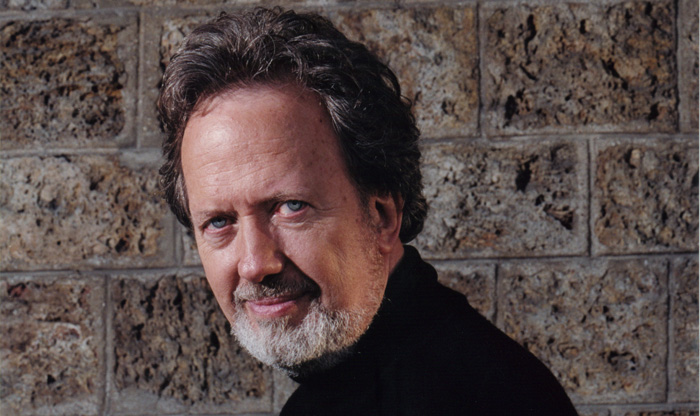

Born in Costa Rica to American parents, John Nelson studied at
the Juilliard School
where he won the Irving Berlin prize in conducting. He has held
the
title of Music Director of the Indianapolis Symphony, the Opera Theatre
of St. Louis, and the Caramoor Music Festival in New
York. He has also been Principal Guest Conductor of the Orchestre
National de Lyon and Artistic Adviser to the Nashville and Louisville
Orchestras. Presently (2009), he holds the title Directuer
Musicale Honoraire of the Ensemble Orchestral de Paris.
More details about his life and career can be found in the box
at the end of this presentation.
Nelson has conducted in The Windy City on several occasions,
and for a trip in the fall of 1993 his task
was Don Quichotte, the
setting of the Don Quixote tale by the French composer Jules Massenet
at Lyric Opera of Chicago. He graciously took time from his very
busy rehearsal schedule to speak with me about many things.
We met in his apartment, and while we were getting ready, the
chat turned to various singers who
crossed over into the instrumental world . . . . .
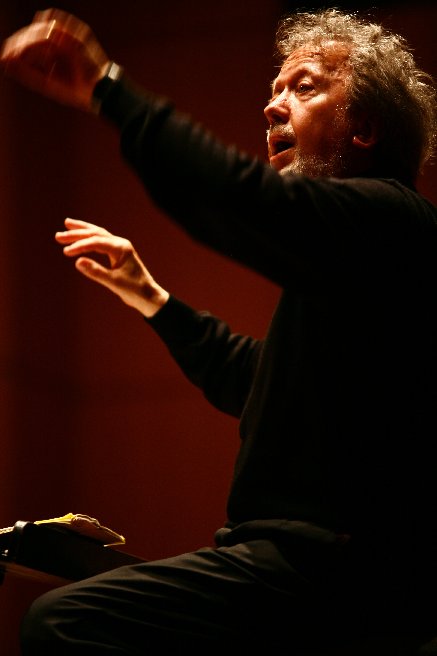 JN: With the score,
obviously. The lady who had
lost her voice just acted it out onstage,
but she had absolutely no voice! So I had to feed this lady in
the pit. She
was a young kid in the chorus. She was at Boston University
during the year, and this was her big moment! It got caught by
the papers, somehow. There were some reviews and even notice got
back to Boston in the Boston Globe
that this little gal had
sang the third act of Onegin.
JN: With the score,
obviously. The lady who had
lost her voice just acted it out onstage,
but she had absolutely no voice! So I had to feed this lady in
the pit. She
was a young kid in the chorus. She was at Boston University
during the year, and this was her big moment! It got caught by
the papers, somehow. There were some reviews and even notice got
back to Boston in the Boston Globe
that this little gal had
sang the third act of Onegin.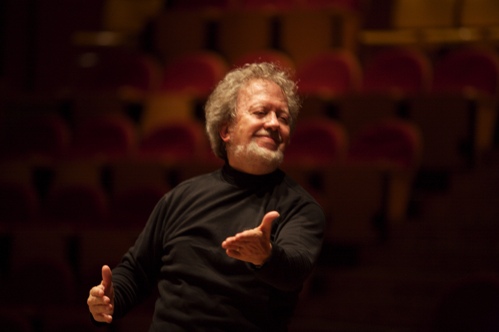 JN: It’s the second
and third. I certainly
will do that for pieces that I believe in. I will do that a
lot! I’ve done that for all the composers that I mentioned just
now. As we speak, I’m working on a project for Gorecki.
I’ve done a number of his works and I’ve recorded his things.
I’m working on another recording and am also in the process of
commissioning him to do something new. It’s thrilling to
bring new music back, over and over! For me, the true test of the
greatness of a piece is how well it
lasts in your own mind. Because we all have highly
sophisticated minds and feelings, musicians have been spending our
lives in this, or listening to it. Our sensitivities are very
sophisticated and we tire very easily, but great music you’ll
never tire from! Never! I guess it’s possible to play
a Brahms Fourth for
twenty-four hours and you don’t want to hear it
anymore. That’s not the point. When it comes time to listen
to it again, you can’t wait to hear it! You discover new
things. You listen to it a third time and it is like you never
heard that before! You listen to it a hundred and fifth time and
it
is still alive, giving you back much more than you give it!
That’s a sign, for me, of great music. And I’ve found that to be
the case with some of the contemporary composers that I work with.
JN: It’s the second
and third. I certainly
will do that for pieces that I believe in. I will do that a
lot! I’ve done that for all the composers that I mentioned just
now. As we speak, I’m working on a project for Gorecki.
I’ve done a number of his works and I’ve recorded his things.
I’m working on another recording and am also in the process of
commissioning him to do something new. It’s thrilling to
bring new music back, over and over! For me, the true test of the
greatness of a piece is how well it
lasts in your own mind. Because we all have highly
sophisticated minds and feelings, musicians have been spending our
lives in this, or listening to it. Our sensitivities are very
sophisticated and we tire very easily, but great music you’ll
never tire from! Never! I guess it’s possible to play
a Brahms Fourth for
twenty-four hours and you don’t want to hear it
anymore. That’s not the point. When it comes time to listen
to it again, you can’t wait to hear it! You discover new
things. You listen to it a third time and it is like you never
heard that before! You listen to it a hundred and fifth time and
it
is still alive, giving you back much more than you give it!
That’s a sign, for me, of great music. And I’ve found that to be
the case with some of the contemporary composers that I work with.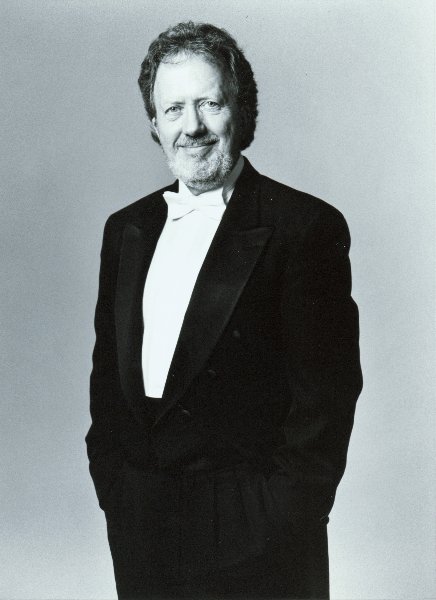 BD: Do you always
make sure that the group in front
of you, though, has played the whole thing top to bottom?
BD: Do you always
make sure that the group in front
of you, though, has played the whole thing top to bottom?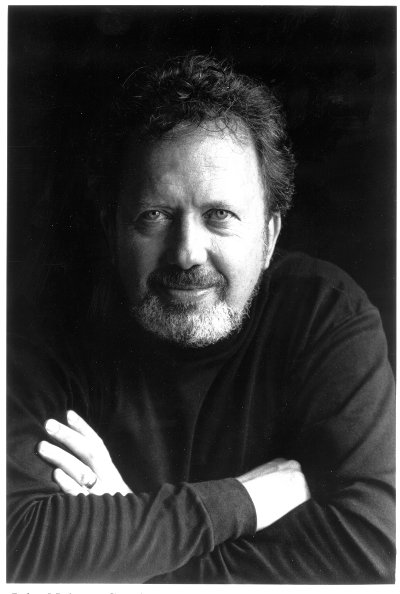 BD: It’s given to
them, but you have
found it?
BD: It’s given to
them, but you have
found it?|
The distinguished American conductor John Nelson is one of the world’s most versatile and accomplished conductors. He is highly regarded not only for his great interpretations of large Romantic works and his stylish performances of Baroque music, but also for his vibrant Mozart and Haydn and his devotion to new music. Born in Costa Rica, John Nelson studied at the Juilliard School where he won the Irving Berlin prize in conducting. He has held the titles of Music Director of the Indianapolis Symphony, the adventurous Opera Theatre of St. Louis, and the Caramoor Music Festival in New York. He has also been principal guest conductor of the Orchestre National de Lyon and artistic adviser to the Nashville and Louisville Orchestras. Presently John Nelson holds the title Directuer Musicale Honoraire of the Ensemble orchestral de Paris. John Nelson conducts in virtually all the major cities of the world. In America he has appeared with all the major orchestras including the New York Philharmonic, the Los Angeles Philharmonic, the Philadelphia Orchestra and the symphony orchestras of Boston, Chicago, Cleveland, Pittsburgh and San Francisco. In England he has conducted the London Symphony, the Philharmonia, the Royal Philharmonic, the Halle, the Bournemouth Symphony and the Scottish National Orchestra. He has been engaged by the Leipzig Gewandhaus, the Dresden Staatskappelle, the Gurzenich Orchestra in Cologne as well as the Radio Orchestras of Hamburg, Munich, Berlin and Saarbrucken. Other European orchestras include the Suisse Romande in Geneva, the Academia di Santa Cecilia in Rome, the Maggio Musicale in Florence, and the orchestras of Oslo, Rotterdam, the Hague and all the major orchestras in France. A frequent visitor to the Far East, Mr. Nelson has conducted the New Japan Philharmonic, the Hong Kong and Shanghai Philharmonics, while down under has appeared with all the orchestras in Australia. Maestro Nelson made his professional opera debut at the New York City opera in 1972 in Carmen and his Metropolitan Opera debut in 1974 be stepping in on sudden notice to replace an ill Rafael Kubelik in Berlioz’ Les Troyens. It was this occasion that catapulted him into the limelight and led to his European debut at the Geneva Grand Theatre (Les Troyens) and his French debut at the Berlioz Festival in Lyon (Beatrice and Benedict). He has since conducted opera in major companies around the world including the Chicago Lyric Opera, Santa Fe Opera, the Bastille Opera, Lyon Opera, Rome Opera, La Monnaie, the Netherlands Opera and the Welsh National Opera. Central to John Nelson’s work is the interpretation of the great sacred choral literature for which he is renowned. In 1985, the 300th anniversary of Bach and Handel, Mr. Nelson was chosen to celebrate both composers’ birthday concerts at Carnegie Hall including the two Passions and the B minor Mass in a single week. His love of choral music has brought him to the Atlanta Symphony following Robert Shaw’s death to conduct the Brahms German Requiem, Beethoven’s Missa Solemnis and last season, Mendelssohn’s Elijah. His commitment to this repertoire and his concern for the lack of 20th century sacred works led him to found SOLI DEO GLORIA, Inc., a non-profit organization which encourages composers and conductors to promote great sacred works in our time. The latest work to be sponsored by SDG is Christopher Rouse’s Requiem, commissioned to commemorate Berlioz 200th anniversary in 2003. Recording has become an increasing activity in Mr. Nelson’s career. In addition to his many recordings with his orchestra and EMI he has also recorded with SONY, Deutsche Gramophone, Decca, BMG, Erato, New World Records and Naive. His awards include a Grammy for Handel’s Semele and a Diapason d’Or de l’année for Berlioz’ Beatrice and Benedict. Recently released is a DVD recording of Bach B Minor Mass filmed at Notre Dame in Paris with the Ensemble Orchestral de Paris , a recording of the complete Beethoven Symphonies cycle as well as Mozart Symphonies No 31, 39, 40 and 41 on Ambrosie label . Recent/future engagements include performances of Der Freischutz and Damnation of Faust at
the Geneva Opera, The Trojans
at the Stuttgart
Staatstheater and the Netherlands Opera, concerts with the Sydney
Symphony, Singapore Symphony and Hong Kong Philharmonic orchestras as
well as DVD projects of Beethoven Missa
solemnis with the Chamber
Orchestra of Europe & the Gulbenkian Chorus, Haydn Creation and
Bach St Matthew Passion with
the Netherlands Radio Kammerphilharmonie
and Radio Chorus. -- IMG Artists Biography,
April, 2009 |
This interview was recorded in Chicago on October 4,
1993.
Portions (along with recordings)
were used on WNIB later that year, and again in 1996 and 1999.
This transcription was
made and posted on this
website in 2009.
To see a full list (with links) of interviews which have been transcribed and posted on this website, click here.
Award - winning broadcaster Bruce Duffie was with WNIB, Classical 97 in Chicago from 1975 until its final moment as a classical station in February of 2001. His interviews have also appeared in various magazines and journals since 1980, and he now continues his broadcast series on WNUR-FM, as well as on Contemporary Classical Internet Radio.
You are invited to visit his website for more information about his work, including selected transcripts of other interviews, plus a full list of his guests. He would also like to call your attention to the photos and information about his grandfather, who was a pioneer in the automotive field more than a century ago. You may also send him E-Mail with comments, questions and suggestions.